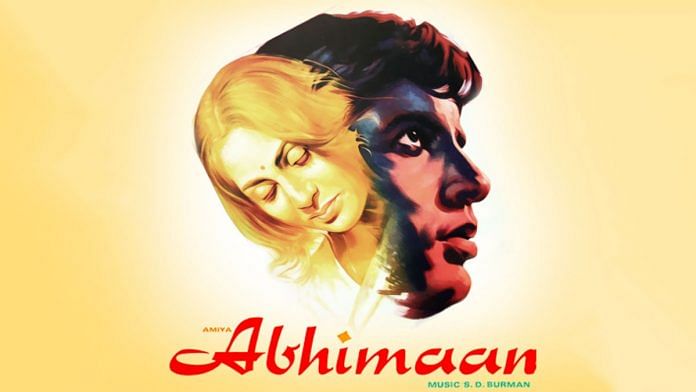New Delhi: It is a truth universally acknowledged that when Abhimaan (1973) was being filmed, Jaya Bhaduri was a star and Amitabh Bachchan was not. She had debuted as a teenager in Satyajit Ray’s Mahanagar (1963), had gone on to attend the FTII in Pune, from where she graduated as the gold medallist in her year, and already had several hits to her name — thanks in no small part to her realistic, understated and nuanced performances. He, on the other hand, had featured in over a dozen flops and only one hit, Anand (1971), in which he played a supporting role to Rajesh Khanna.
So for Hrishikesh Mukherjee, who was known more for clean comedy, to cast Amitabh and Jaya in a film about a singer-couple who separate because the husband cannot handle his wife’s success, was brave in more ways than one.
Mukherjee passed away on 27 August 2006, leaving behind a legacy dotted largely with feel-good comedies and cute love stories, but he did sometimes venture into darker territory. If Anand was a more emotional look at the business of life and death, Abhimaan was a deeper, more mature exploration of the dark side of human relationships, and soon became a classic for its undertones of feminism — rare in Hindi cinema. This weekend, ThePrint revisits Abhimaan.
Feminism in a traditional mould
The films opens by introducing Subir Kumar (Amitabh), one of India’s most famous singers. Early on, he’s shown as someone who takes his success for granted, earning reproach from his adoring manager, Chandru (Asrani), to be more disciplined and diligent.
On a trip from Mumbai to his village to visit his aunt, Subir meets Uma (Jaya), a local girl with a gorgeous voice, trained in classical music by her father. They marry and at the wedding reception, Subir proclaims that he will now only sing with her.
A senior colleague, Brajeshwar Rai (David), immediately predicts disaster, because it is evident that Uma is the more talented of the two, a fact that most men, Subir included, will not be able to handle.
He is proved right when Uma starts to bring home more awards, more work and soon, more money. Subir hits the bottle more and more, and takes to revisiting the home of his old flame, Chitra (Bindu, in a surprisingly sweet, supportive role) as well as verbally attack his wife and make her feel guilty and unwanted.
A gaslit Uma decides to quit singing, but when things don’t improve, she leaves him and returns home, pregnant. The trauma of a miscarriage becomes the catalyst that reunites the couple, and eventually, she does sing again — with her husband.
Today, Abhimaan might just about scrape through the test of feminism (particularly in the simplistic way that the couple gets back together, with a seemingly token apology from Subir), but for its time, it was seen as an incredibly progressive take on the sacrifices working women often have to make for the sake of their marriage.
Some of the film’s strongest moments, though, are the conversations between Uma and Chitra. A heartbroken Chitra arrives at the couple’s wedding reception with flowers, and the two women meet with immense grace and dignity. This is echoed in a later scene when Uma, knowing that her distant, sullen husband would have gone to Chitra’s house to drown his sorrows, makes her way there to take him back home. The women share a lovely, mature moment of understanding, while Subir, having drunk a fair bit to assuage his wounded male ago, lies passed out on Chitra’s bed.
Music was the real star
As with many of Mukherjee’s films, Abhimaan featured some beautiful songs, many of which are well-known even almost 50 years later. But the music wasn’t meant as entertainment — it was, in a sense, the film’s narrator.
Subir meets and falls in love with Uma when he hears her sing; it is when they sing Teri Bindiya Re together at their reception that everyone is stunned by Uma’s talent; the couple’s dream of a child is marked by Tere Mere Milan Ki Yeh Raina (which also features at the end, when they sing it together and finally begin to heal) and Uma’s loneliness shines through in Piya Bina Piya Bina, which she sings at a ceremony where she is being honoured, while Subir is drinking at Chitra’s.
Blurring the lines between reality and fiction
The film, though inspired by the story of sitarists Ravi Shankar and Annapurna Devi, also came to be seen as an example of real life echoing the screen.
Jaya Bhaduri, the star who agreed to act in Zanjeer (1973) for the sake of her fiancé, Amitabh, when many leading actors didn’t want to star opposite him, married him just a month before the release of Abhimaan.
Two years later, after the birth of their daughter, Jaya Bachchan all but quit acting for almost 20 years: Her last film as a lead actor was in Silsila (1981) with Amitabh, Rekha and Sanjeev Kumar. She returned to the screen only in 1998 with the critically acclaimed Hazaar Chaurasi Ki Maa and has since appeared in a few films in supporting roles.
Also read: Middle-class cinema’s pioneer Hrishikesh Mukherjee was all about stories with heart



